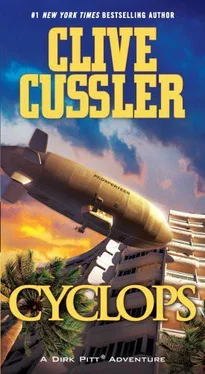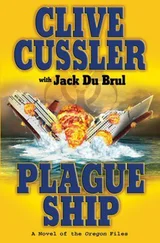Velikov grinned crookedly. He seemed to have no nerves at all. "Another man, another time, and you will surely be killed, Fidel. I know. I helped create five alternative plans in case this one failed."
<6>EUREKA! THE LA DORADA
November 8, 1989
Washington, D.C.
<<75>>
Martin Brogan walked into the early-morning cabinet meeting late. The President and the men seated around the large kidney-shaped table looked up expectantly.
"The ships were detonated four hours ahead of schedule," he informed them while still standing.
His announcement was greeted with solemn silence. Every man at the table had been told of the unbelievable plan by the Soviets to remove Castro, and the news struck them more as an inevitable tragedy than a shocking catastrophe.
"What are the latest reports on loss of life?" asked Douglas Oates.
"Too early to tell," replied Brogan. "The whole harbor area is in flames. The deaths could conceivably total in the thousands. The devastation, however, is not nearly as severe as we first projected. It appears our agents in Havana seized two of the ships and sailed them out of the harbor before they exploded."
As they listened in contemplative quiet, Brogan read from the initial reports sent from the Special Interests Section in Havana. He recounted the details of the plan to move the ships and the sketchy details of the actual operation. Before he had finished, one of his aides entered and slipped him an updated report. He scanned it silently and then read the first line.
"Fidel and Raul Castro are alive." He paused to gaze at the President. "Your man, Ira Hagen, says he is in direct contact with the Castros and they have requested any assistance we can offer in the way of disaster relief, including medical personnel and supplies, firefighting equipment, food and clothing, and also morgue and embalming experts."
The President looked at General Clayton Metcalf, chairman of the joint Chiefs of Staff. "General?"
"After your call last night, I alerted Air Transport Command. We can begin the airlift as soon as the people and supplies arrive at the airfields and are loaded on board."
"Any approach by American military aircraft had better be coordinated or the Cubans will cut loose with their surface-to-air missiles," pointed out Secretary of Defense Simmons.
"I'll see to it a line of communication is opened with their Foreign Ministry," said Secretary of State Oates.
"Better make it clear to Castro that any relief we send is organized under the umbrella of the Red Cross," added Dan Fawcett. "We don't want to scare him into slamming the door."
"An angle we can't overlook," said the President.
"Almost a crime to take advantage of a terrible disaster," mused Oates. "Still, we can't deny it's a heaven-sent opportunity to cement relations with Cuba and defuse revolutionary fever throughout the Americas."
"I wonder if Castro has ever studied Simon Bolivar?" the President asked no one in particular.
"The Great Liberator of South America is one of Castro's idols," replied Brogan. "Why do you ask?"
"Then perhaps he's finally heeded one of Bolivar's quotations."
"Which quotation is that, Mr. President?"
The President looked from face to face around the table before answering. " " `He who serves a revolution plows the sea.' "
<<76>>
The chaos slowly subsided and the rescue work began as the population of Havana recovered from the shock. Hurricane emergency procedures were put into operation. Army and militia units along with paramedics sifted through the rubble, lifting the bodies of the living into ambulances and the dead into trucks.
The Santa Clara convent, dating from 1643, was taken over as a temporary hospital and quickly filled. The wards and corridors of University Hospital soon overflowed. The elegant old Presidential Palace, now the museum of the revolution, was turned into a morgue.
Injured people walked the streets bleeding, staring vacantly or searching desperately for loved ones. A clock on top of a building in Cathedral Square of old Havana sat frozen at 6:21. Some residents who had fled their homes during the havoc began to drift back. Others who had no homes to return to walked through the streets, picking their way around the bodies, carrying small bundles containing salvaged possessions.
Every fire unit for a hundred miles streamed into the city and vainly fought the fires spreading throughout the waterfront. A tank of chlorine gas exploded, adding its poison to the ravages of the blaze. Twice the hundreds of firefighters had to run for cover when a change of wind whipped the blistering heat in their faces.
Even while the rescue operations were being organized, Fidel Castro launched a purge of disloyal government officials and military officers. Raul personally directed the roundup. Most had abandoned the city, having been forewarned of Rum and Cola by Velikov and the KGB. One by one they were arrested, each one stunned by the news the Castro brothers were still alive. By the hundreds they were transported under heavy guard to a secret prison compound deep in the mountains, never to be seen again.
At two o'clock in the afternoon the first U.S. Air Force heavy cargo plane landed at Havana's international airport. Soon a constant stream of aircraft were arriving. Fidel Castro was on hand to greet the volunteer doctors and nurses. He personally saw to it that Cuban relief committees stood by to receive the supplies and cooperate with the incoming Americans.
By early evening, Coast Guard and firefighting vessels from the port of Miami began to stream over the smoke-filled horizon. Bulldozers, heavy equipment, and oil-fire experts from Texas moved into the fiery wreckage along the harbor and wasted no time in attacking the flames.
Despite past political differences the imagination of the United States and Cuba seemed to leap to the occasion and everyone worked together closely on the specific emergencies to be met.
Admiral Sandecker and Al Giordino stepped off a NUMA jet late in the afternoon. They hitched a ride on a truck, loaded with bed linen and military cots, as far as a distribution depot, where Giordino hot-wired and borrowed an abandoned Fiat.
The false sunset from the flames tinted their faces red through the windshield as they gazed incredulously at the gigantic smoke cloud and great sea of fire.
After nearly an hour of winding their way through the city and being directed by police through complicated detours to avoid streets choked with debris and rescue vehicles, they finally reached the Swiss Embassy.
"We have our job cut out," said Sandecker, staring at the ruined buildings and the wreckage littering the wide boulevard of the Malecon.
Giordino nodded sadly. "He may never be found."
"Still, we owe it to him to try."
"Yes," Giordino said heavily. "We owe Dirk that."
They turned and walked through the battered entrance of the embassy and were directed to the communications room of the Special Interests Section.
The room was jammed with news correspondents, waiting their turn to transmit reports of the disaster. Sandecker shouldered his way through the throng and found a heavyset man dictating to a radio operator. When the man finished, Sandecker tapped him on the arm.
"You Ira Hagen?"
"Yes, I'm Hagen." The hoarse voice matched the tired lines in the face.
"Thought so," said Sandecker. "The President described you in some detail."
Hagen patted his rotund stomach and forced a smile. "I'm not hard to pick out in a crowd." Then he paused and looked at Sandecker strangely. "You say the President--"
"I met with him four hours ago in the White House. My name is James Sandecker and this is Al Giordino. We're with NUMA."
"Yes, Admiral, I know the name. What can I do for you?"
Читать дальше












